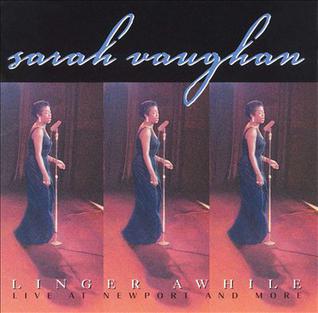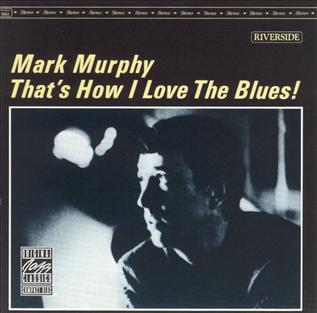
Sarah Lois Vaughan was an American jazz singer and pianist. Nicknamed "Sassy" and "The Divine One", she won two Grammy Awards, including the Lifetime Achievement Award, and was nominated for a total of nine Grammy Awards. She was given an NEA Jazz Masters Award in 1989. Critic Scott Yanow wrote that she had "one of the most wondrous voices of the 20th century".

William Clarence Eckstine was an American jazz and pop singer and a bandleader during the swing and bebop eras. He was noted for his rich, almost operatic bass-baritone voice. In 2019, Eckstine was posthumously awarded the Grammy Lifetime Achievement Award "for performers who, during their lifetimes, have made creative contributions of outstanding artistic significance to the field of recording". His recording of "I Apologize" was given the Grammy Hall of Fame Award in 1999. The New York Times described him as an "influential band leader" whose "suave bass-baritone" and "full-throated, sugary approach to popular songs inspired singers such as Earl Coleman, Johnny Hartman, Joe Williams, Arthur Prysock, and Lou Rawls."

Like Someone in Love is a 1957 studio album by the American jazz singer Ella Fitzgerald, with a studio orchestra arranged and conducted by Frank DeVol. This album represents a fine example of Ella's singing from this period, recorded at the same time as her albums with Louis Armstrong.

"All Alone" is a popular waltz ballad composed by Irving Berlin in 1924. It was interpolated into the Broadway show The Music Box Revue of 1924 where it was sung by Grace Moore and Oscar Shaw. Moore sat at one end of the stage under a tightly focused spotlight, singing it into a telephone, while Oscar Shaw sat at the other, doing the same.
"You're Just in Love" is a popular song by Irving Berlin. It was published in 1950 and was first performed by Ethel Merman and Russell Nype in Call Me Madam, a musical comedy that made its debut at the Imperial Theatre in New York City on October 12 that year. The show ran for 644 performances. Ethel Merman also later starred in the 1953 film version, with Donald O'Connor.
"Lush Life" is a jazz standard that was written by Billy Strayhorn from 1933 to 1936. It was performed publicly for the first time by Strayhorn and vocalist Kay Davis with the Duke Ellington Orchestra at Carnegie Hall on November 13, 1948.
"I Gotta Right to Sing the Blues" is a popular song with music by Harold Arlen and lyrics by Ted Koehler, published in 1932 for the Broadway show Earl Carroll's Vanities (1932). The song has become a jazz and blues standard. Popular recordings in 1933 and 1934 were those by Cab Calloway, Louis Armstrong and Benny Goodman.
"Isn't This a Lovely Day?" is a popular song written by Irving Berlin for the 1935 film Top Hat, where it was introduced by Fred Astaire in the scene where his and Ginger Rogers' characters are caught in a gazebo during a rainstorm. The lyric is an example of a song which turns a bad situation into a love song, a common style for Irving Berlin, as in "I've Got My Love to Keep Me Warm" and "Let's Have Another Cup of Coffee".
"Now It Can Be Told" is a popular song written by Irving Berlin for the 1938 film Alexander's Ragtime Band, where it was introduced by Alice Faye and Don Ameche. It was nominated for an Academy Award in 1938 but lost out to "Thanks for the Memory".
"More Than You Know" is a popular song, composed by Vincent Youmans with lyrics by Billy Rose and Edward Eliscu. The song was published in 1929.

"Remember" is a popular song about nostalgia by Irving Berlin, published in 1925. The song is a popular standard, recorded by numerous artists.

Sarah Vaughan Sings Broadway: Great Songs from Hit Shows is a 1958 studio album by Sarah Vaughan.

No Cover, No Minimum is a live album by Billy Eckstine that was recorded in Las Vegas. The album was released by Roulette in 1960 and reissued by Blue Note in 1992 with ten additional tracks.

Billy Eckstine Sings with Benny Carter is a 1986 album by the American singer Billy Eckstine, accompanied by the alto saxophonist Benny Carter. The singer Helen Merrill appears in duet with Eckstine on the first and last songs of the album. This was Eckstine's only LP released on Verve Records, and marked his final album recordings.

Linger Awhile: Live at Newport and More is a 2000 album by Sarah Vaughan, featuring eight tracks recorded at the 1957 Newport Jazz Festival and studio tracks from 1978 and 1982.

Sassy Swings Again is a 1967 studio album by Sarah Vaughan. This was Vaughan's last album for Mercury Records, and her last studio recording for four years.

That's How I Love the Blues! is an album by American jazz vocalist Mark Murphy featuring tracks recorded in late 1962 for the Riverside label.
"All of My Life" is a 1944 song composed by Irving Berlin. It was first recorded in 1945 by Bing Crosby whose version reached No. 12 in the Billboard charts. Other chart hits in 1945 were by Sammy Kaye and his Orchestra and by The Three Suns.
"I Never Had A Chance" is a popular song written by Irving Berlin, published in 1934. Popular versions that year were by Eddy Duchin and by Glen Gray & The Casa Loma Orchestra.

Irving Berlin's 100th Birthday Celebration was a concert special held in his honor at Carnegie Hall on May 11, 1988. It was aired on CBS television two weeks later, on May 27. At the 40th annual Emmy Awards later that summer, on August 28, it won two Emmys for outstanding variety, music or comedy program. Berlin himself did not attend, as he had retired from public life.













